




 |
   |
 |
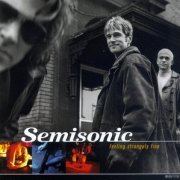 |
Feeling Strangely Fine (1998, 50.20) ***/T½ |
|
| Closing Time Singing in My Sleep Made to Last Never You Mind Secret Smile DND Completely Pleased This Will Be My Year |
All Worked Out California She Spreads Her Wings Gone to the Movies |
|
Current availability:
Mellotron used:
I've seen Minneapolis natives Semisonic described as 'alternative rock'; alternative to what? Rock, presumably, as there's no getting away from the fact that they're full-on indie-schmindie (US division). In fairness, their second album, Feeling Strangely Fine, isn't entirely unappealing, the Beatlesy piano-driven Never You Mind, with its weird lyrical sidetrack into Star Trek territory, managing to hold my attention throughout its length. Pity about the cheesy Secret Smile, but there you go.
Plenty of vintage keys here, with Wurly piano and/or Hammond on at least half the tracks. Only one credited Mellotron track from Jacob Slichter, with a nice string part on She Spreads Her Wings, which is odd, as it's also clearly audible on two others, with a string part on opener (and largish hit) Closing Time and understated flutes on the other hit, Secret Smile, although the strings on DND sound real.
See: Samples etc. | Dan Wilson
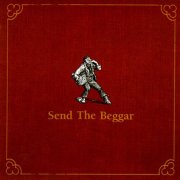 |
Send the Beggar (1998, 39.42) **/T½ |
|
| Tangled With the Error Tuesday Afternoon When We're Gone Rome is Sinking Winding Roads Matter Head First, Face Down Jar |
All I Know Prodigal |
|
Current availability:
Mellotron (& Chamberlin?) used:
Send the Beggar were an unholy (ha ha) cross between CCM and '90s alt.rock, thereby neutering two already neutered genres, their eponymous 1998 release at its least horrible on Matter, with its propulsive guitar-plays-against-delay effect. Note: least horrible, not best.
Phil Madeira plays Mellotron, as he's done for so many other Christian outfits, with flute and string parts on When We're Gone, although the low strings on closer Prodigal sound more like Chamberlin than Mellotron, despite one not being credited. You didn't want to hear this anyway, did you? DID YOU?
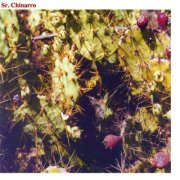 |
Sr. Chinarro (1994, 48.34) **½/T |
|
| El Collar Mi Caracola Campanario Bye Bye Hate Niño Helado Velvet Eye Buenos Días |
Escapa Amanecer En el Panal Una Rodillita Dos Leave Me Alone Buenas Noches |
|
Current availability:
Mellotron used:
Antonio Luque formed Sr. (Señor) Chinarro in 1990, still active over thirty years later. They debuted with their eponymous 1994 album, possibly best described (if you're feeling generous) as Latin indie, or dreary indie nonsense, if you're not. Luque's laid-back vocals are typically indie in their tunelessness, meaning the best tracks here are probably brief piano instrumentals Buenos Días and closer Buenas Noches.
Kramer plays (presumably) his own M400, as the album was recorded at his Noise New Jersey studio, with an unusually (by his standards) full-on strings part on Velvet Eye. I have no idea what their more recent albums sound like, but, if I were you, I'd avoid Sr. Chinarro. Life really is too short.
See: Kramer
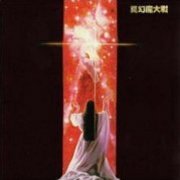 |
Shingenma Teisen (1984, 36.35) ***½/TBig PrologueVega Pejour Cruse (Flight #39) Sadistic Psychic Tiger Moonlight Serenade Superbaroque Princess Taiyo no Senshi Beatoris no Kanzashi Big Interlude |
Current availability:
Mellotron used:
Sense of Wonder were a keyboard-heavy Japanese outfit, led by Hiroyuki Namba, yet another in a long line of ferociously good ivory-ticklers from that country. I believe they debuted with 1984's Shingenma Teisen (or ... Taisen, transliterations vary), which veers between the pomp-and-circumstance of Big Prologue and Vega Pejour Cruse (Flight #39), the (ridiculous) straight-ahead hard rock of Sadistic Psychic Tiger, albeit with synths riffing instead of guitars and the 'classical rock' of Superbaroque Princess (complete with outrageously dated Simmons pads), the 'keyboard pomp' approach being the most popular.
Although the choirs on Big Prologue sound like early generic samples, Namba's strings and male choirs on Taiyo No Senshi are clearly Mellotronic, as are the few seconds of strings on Beatoris No Kanzashi, although the strings on closer Big Interlude sound real. Well, you're not going to track this one down easily - it took me ages to even find a download - but if you can cope with the cheesiness of most Japanese '80s prog, it's well worth the effort, albeit not especially for the Mellotron.
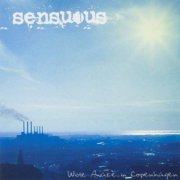 |
Wide Awake in Copenhagen (2005, 52.10) ***/TTT |
|
| Sunshine Baby Stay Out of Reach Wait for Me Young Lovers Dream Wonderful Times Down |
Sunday Morning Don't Go Let Me Die for Hours What if Waste |
|
Current availability:
Mellotron used:
Denmark's Sensuous are amazingly difficult to find out anything about, making me suspect that they only made the one album, 2005's Wide Awake in Copenhagen (U2 send-up?), most 'Net information about them quietly falling off the digital map over the last decade or so, as it tends to. The album is a mainstream-end-of-powerpop release, for want of a better description, at its best on opener Sunshine Baby and Down, although too many tracks trudge along in a lacklustre kind of way, sadly.
To my surprise, Andreas Kaj plays what sounds like real Mellotron across the album, with upfront strings and flutes (sometimes doubled) on opener Sunshine Baby, cello and flute on Stay, cello and strings on Dream and Sunday Morning and strings on Out Of Reach, Young Lovers, Down and What If, although the strings on several other tracks sound real.
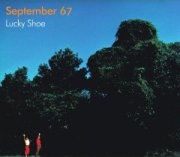 |
Lucky Shoe (1996, 47.24) **½/½ |
|
| Busy Building Setting the Old House on Fire Fire Engine Red Lucky Shoe What's Wrong With Alice Giant Mercy is the Red Bird |
Don't Break Hazel Motes Poor Boy Cassandra on the Dance Floor Little Lantern Face Bring Back the Weight |
|
Current availability:
Mellotron used:
September 67 were a one-off project from Shannon Worrell, whose '96 album, Lucky Shoe, is a sort of alt.country/indie crossover effort, which is about as appealing as it sounds (take that any way you like). It has its moments, notably the last two tracks, Little Lantern Face and Bring Back The Weight, but it begins to drag badly after a while and could very well have been shorter without compromising itself.
David Lowery plays Mellotron, with string and cello parts on Giant that don't especially add to the track. Overall, then, a rather ordinary effort, although at least it doesn't overly pander to commerciality, which has to be a bonus. Absolutely not worth it on the Mellotron front, anyway.
See: Shannon Worrell
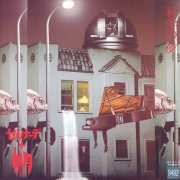 |
Night Collector (1995, recorded 197?-198?, 59.47) ****/TTTT |
|
| Yomigaeru Kioku Kaiki part 1 Kaiki part 2 Satsui Henu Funade part 2 Syuumatsu Sakin No Uzu Sima He Kaerou Papa To Isshoni |
Return of the Night Take Hikaru Akane Sasu Roman Fuu Maborosi |
|
Current availability:
Mellotron used:
Shingetsu only ever released one album 'proper', a self-titled effort from '79, but Night Collector (possibly also known as Kagaku no Yoru) appeared in 1995, collecting unreleased Shingetsu material along with recordings by their earlier incarnation, Serenade. The two bands shared a vocalist (Makoto Kitayama) and keyboard player (Akira Hanamoto), but they sounded noticeably different, largely due to the differing guitarists. Due to my somewhat non-existent Japanese, it's difficult to tell when the material dates from, but I think it says the Serenade stuff is from around '76, with the Shingetsu being from '79 and (probably) later. Whatever, it's a more than worthwhile release, with the more symphonic Serenade stuff being particularly worthy of mention.
The disc breaks down as follows: tracks 1-5, Serenade, tracks 6-9, Shingetsu Mk.1, tracks 10-13, Shingetsu Mk.2. The Mk.1 Shingetsu stuff isn't that great, to be honest, but the Mk.2 tracks are as good as the Serenade ones, both of which feature Hanamoto's Mellotron pretty heavily. Kaiki Part 1 has some serious string swells, while Part 2 has Mellotron cellos on the intro, followed by a lengthy flute part. Satsui Henu Funade Part 2 (no part 1, it seems) sounds like it's going to be Mellotron-free until several minutes into the lengthy piece, as some sterling strings work rushes in, including a wonderful pitchbent chord at the end. Despite the tape hiss, the Mellotron flutes/strings/cellos of the under-two minute Syuumatsu are absolutely beautiful, proving Hanamoto-san to be a master of the instrument; why is he not more widely known? Two Mk.2 Shingetsu tracks have more strings/flutes/cellos (guess what tape set they had?), making for some serious Mellotron content, despite the four dodgier (note: not dodgy) tracks.
I found this by complete accident in a cheap CD section, only picking it up because of its striking sleeve design; as you can see, there's no band name on the cover and I didn't even know there was a Mellotron on board. I can't see you being quite so lucky, but I'll put my reputation (which reputation was that?) on the line and say; buy.
See: Shingetsu | Makoto Kitayama with Shingetsu Project
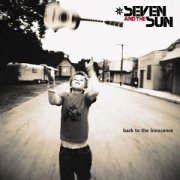 |
Back to the Innocence (2002, 42.05) *½/T½ |
|
| Jump (the Velvet Rope) Where Do We Go From Here Walk With Me Black & Blue I Pray Back to the Innocence Say it's So Don't Ask Me Why |
Tell Me I Won't Look Back Happy in Your Misery |
|
Current availability:
Chamberlin used:
Despite having a minor hit with Walk With Me, Seven & the Sun released just the one album, 2002's Back to the Innocence; after listening to it, I can only say, "Thank fuck for that". This is the worst kind of millennial 'indie rock', for want of a better phrase, all 'heartfelt' vocals, programmed beats and hip hop-lite production tricks. There are no best tracks.
Patrick Warren plays uncredited Chamberlin, with upfront strings on Black & Blue, Say It's So (plus cellos) and Don't Ask Me Why. Seriously, this is awful. Run away.
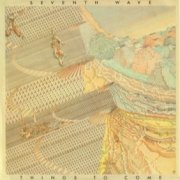 |
Things to Come (1974, 36.02) ***½/T | |
| Sky Scraper Metropolis Intercity Water Rat Escalator Old Dog Song Smog, Fog and Sunset Fail to See Premonition |
Festival Eversolightly Communication Skyways Things to Come 1999½ Dance of the Eloi |
|
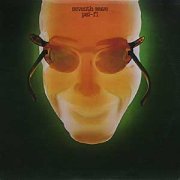 |
Psi-Fi (1975, 45.37) ***/½ |
|
| Return to Foreverland Roads to Rome Manifestations Loved By You Only the Beginning Aether Anthem Astral Animal El Tooto |
Camera Obscura Star Palace of the Sombre Warrior |
|
Current availability:
Mellotrons used:
Seventh Wave were one of those odd little British progressive bands who never escaped from the third division, saleswise, although they did actually have something to offer in places. Rising from the ashes of psych-monsters Second Hand, the duo of the (now sadly late) Kieran O'Connor and good keyboardist/bad vocalist Ken Elliott operated mainly in the short song format, with a 'progressive' feel, not to mention keyboards, so there's plenty of those mid-'70s instruments, largely ARP, Moog and EMS synths. The material on Things to Come is a little variable, to be honest, the instrumental stuff tending to work better than the vocal. Apart from the above-mentioned synths and various pianos, there's some Mellotron on a couple of tracks, with a few string chords on Premonition and similar on 1999½, but they're not exactly classics of the genre.
For some odd reason, a (British) south coast minor cult apparently sprung up around Psi-Fi at its time of release, or maybe that was just among the sickos I know. Anyway, I'm afraid to say I think it's pretty ropey; Seventh Wave accentuated the vocal aspects of their music, which was, musically at least, a trip in entirely the wrong direction. Instead of their debut's two-piece band, they toured six or seven musicians, but the end result sounds, to my ears at least, like a bit of a mess, although it does pick up noticeably towards the end, on Camera Obscura and the ridiculously-titled Star Palace Of The Sombre Warrior. The only Mellotron on the album appears to be played by guest Hugh Banton (from Van der Graaf Generator), with about two string chords on Manifestations, although Star Palace... has some choirs that may or may not be real.
I can't really say these are lost classics, but Things to Come isn't at all bad, although neither album is even remotely worth it on the Mellotron front. A 1999 2-on-1 CD reissue apparently replaces Psi-Fi's lone Mellotron track, Manifestations, with its single version, so I've no idea if there's more Mellotron or even less.
See: Chillum | Second Hand
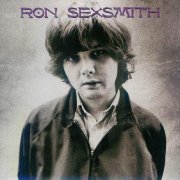 |
Ron Sexsmith (1995, 43.06) ***½/T½ |
|
| Secret Heart There's a Rhythm Words We Never Use Summer Blowin' Town Lebanon Tennessee Speaking With the Angel In Place of You Heart With No Companion |
Several Miles From a Few Streets Over First Chance I Get Wastin' Time Galbraith Street There's a Rhythm |
|
Current availability:
Chamberlin used:
After a couple of cassette releases in the '80s, it took Ontarian Ron Sexsmith nearly a decade to sign to a major and release his eponymous 1995 album, for which we should probably be grateful, as he accidentally avoided the excesses of '80s production 'values' that would, no doubt, have been foisted upon his work. Ron Sexsmith is an unabashed singer-songwriter record, admittedly '90s-style, highlights including opener Secret Heart, the excellent There's A Rhythm (so good it appears in two different versions) and Speaking With The Angel, although little here is surplus to requirements.
Producer Mitchell Froom plays uncredited Chamberlin, with what sounds like muted brass on Words We Never Use and In Place Of You and something woodwindish on Lebanon Tennessee. Sorry to be so vague, but, even after twenty years of trying to identify Chamberlin sounds, they still often elude me. Sexsmith has released over a dozen albums since this effective debut, including one in the Sample section.
See: Samples etc.
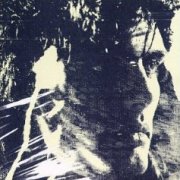 |
Charlie Sexton (1989, 46.46) **½/T |
|
| Don't Look Back Seems So Wrong Blowing Up Detroit I Can't Cry While You Sleep For All We Know Battle Hymn of the Republic Question This |
Save Yourself Cry Little Sister |
|
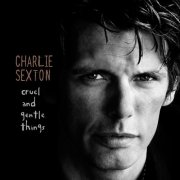 |
Cruel & Gentle Things (2005, 43.31) ***/T |
|
| Gospel Burn I Do the Same for You Cruel and Gentle Things Bring it Home Again Once in a While Just Like Love Regular Grind |
Dillingham Lane It Don't Take Long |
|
Current availability:
Chamberlin/Mellotron used:
Guitarist/vocalist Charlie Sexton was a bit of a child prodigy, releasing a mini-album at fifteen and his first full album, with his brother, before the age of twenty. He's best-known, however, for playing in Bob Dylan's band for several years and several high-profile projects, including work with Lucinda Williams and Edie Brickell (for whom he played Mellotron on her 2003 effort, Volcano), amongst others.
1989's Charlie Sexton is his first solo album, consisting of the kind of rather safe, slightly bluesy Americana-inflected material peddled by the likes of Stevie Ray Vaughan (a mentor of Sexton's) in his later work. Best track? Battle Hymn Of The Republic is about the pokiest thing on offer here, but everything's relative. Suffice to say, while inoffensive, it isn't the kind of album to set the world on fire, not helped by its dodgy '80s drum and keyboard sounds. All of which makes Patrick Warren's presence on Chamberlin all the more surprising, as it's one of the earliest 'tape-replay resurrection' albums I've encountered. He doesn't (obviously) use it a lot, mind, with flutes and strings on I Can't Cry and a few seconds of strings, with a major pitchbend, on closer Cry Little Sister and while it might be hidden away elsewhere, it's not apparent enough to be, er, apparent.
Fast-forward to 2005 and Sexton releases Cruel & Gentle Things, clearly influenced by his long-term employer. It's a massive improvement on his debut, but then, the odious '80s are a distant (if unpleasant) memory, along with their vile production techniques. I'm not saying it's a classic, but tracks like opener Gospel, Burn and Once In A While make it perfectly listenable, in a country/blues kind of way. Three Mellotron players on three tracks: Kevin Lovejoy plays flutes and wavery strings on the title track, Carter Albrecht does nothing audible on Once In A While, while Sexton himself adds strings to closer It Don't Take Long.
Charlie Sexton really isn't that exciting an album, to be frank, although I've heard worse by several orders of magnitude. Its worst crime is probably to be trapped in its time, soundwise, although it's never going to win any awards for imaginative songwriting, either. Or tape-replay use, but then, that was pretty much a given, really. Cruel & Gentle Things is a better proposition all round, if hardly a classic, but at least you can hear the Mellotron on a couple of tracks.
 |
Seeds (2007, 52.31) ***/T |
|
| Happy Thought I Knew Ya Wild Angels Will it Go Round in Circles Goin' to the Country I'm Here There Go I Right Where You Belong |
Marry Me Failure Still Think About You How Far I've Come Wild Angels (Reprise) Keep it Simple |
|
Current availability:
Chamberlin used:
Martin Sexton is a singer-songwriter who draws from folk, country, soul and gospel traditions, all of which make his sixth studio album, 2007's Seeds, possibly slightly too diverse for its own good, better tracks including Marry Me and multi-overdubbed a capella closer Keep It Simple. Several tracks, including Marry Me, feature Sexton's trademark trick of feeding his voice through a fuzzbox and singing 'guitar' solos, which works far better than you might think.
Tom West plays Chamberlin, with a brief flute part on I'm Here and more of the same on Marry Me, although I can't hear anything else obvious. Overall, a middling kind of record, possibly too far from the folk end of things for my personal taste, but good at what it does, despite its low levels of tape-replay.
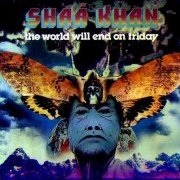 |
The World Will End on Friday (1978, 37.05) ***½/TWhite RoomWorld Will End on Friday Graveyard Ocean Seasons |
Current availability:
Mellotron used:
Shaa Khan are one of those rather second-division German progressive bands who ended up on the Sky label, presumably because Brain didn't want them. They're not bad, exactly, just not that great, either. The World Will End on Friday is a mid-paced sort of affair, with White Room (not that one) and Graveyard being the best tracks, albeit a little unexciting.
The only Mellotron on display, played by Horst Schlechtriemen, is some choir on the title track, but I wouldn't rush out to buy it on those grounds, to be honest. An OK album, but not exactly something to quicken your heart. It's been unavailable for many years, along with its successor, Anything Wrong? (***½), but both albums have just been reissued by German label Sireena, who seem to be tackling the bulk of the Sky catalogue.
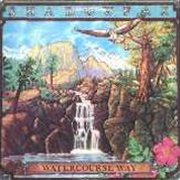 |
Watercourse Way (1976, 41.34) ****/T½The Shape of a WordLinear Dance Petite Aubade Book of Hours Watercourse Way Song for My Brother |
Current availability:
Mellotron used:
Shadowfax (yup, another Lord of the Rings reference) are best-known for their rather dull '80s work on pioneering New Age label Windham Hill, assuming anything about the label could be described as 'pioneering'. However, the Chicago-based act had been in existence in one form or another since 1972, releasing the original version of their debut album, Watercourse Way, in 1976. So, is it full of wussy Chuck Greenberg Lyricon passages? Is it fuck. This is great, dynamic mid-'70s American prog, with nary a hint of the blandness to come, full of angular riffage and fab instrumental interplay, with the energy of a fusion band, without the jazziness. Some combination... The Shape Of A Word and Linear Dance stick pretty closely to this template, while Petite Aubade, with its vague renaissance feel (era, not band), or the title track's proto-World Music stylings could be seen as a portent of things to come, or simply as gentler progressive pieces in the context of a high-energy album.
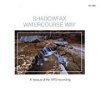 |
There's no one overriding instrumental texture on the album, with Greenberg's wind instruments (acoustic and electric) being more or less prevalent on different tracks, alongside G.E. Stinson's ripping guitar work, particularly on acoustic and Doug Maluchnik's keyboards. Speaking of which, it's alleged that Maluchnik used a Chamberlin on the album, but he's assured me that it's definitely an M400, not that he uses it very much; a short burst of strings in opener The Shape Of A Word and a brief orchestrated section opening Petite Aubade, leaving the nearest the album gets to full-on use being closer Song For My Brother, although 'full-on' is something of a misnomer, actually translating to 'a bit more than anywhere else'.
Watercourse Way was reissued on Lost Lake Arts, a Windham Hill subsidiary, in remixed form; I've no idea whether or not the Mellotron parts survived the remix and I don't feel inclined to track a copy down to find out, to be honest. The band went on to considerable fame and fortune, incorporating 'World' influences into their laid-back chillout style, before Greenberg's untimely death at the age of 45. The album's original release wasn't entirely obscure, being on the worthy Passport label and is worth keeping an eye out for, although I suspect you're unlikely to find a copy outside the States. Happy hunting!
See: Armen Chakmakian
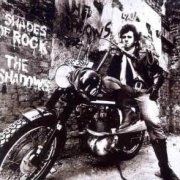 |
Shades of Rock (1970, 34.40) ***/T½ |
|
| Proud Mary My Babe Lucille Johnny B. Goode Paperback Writer (I Can't Get No) Satisfaction Bony Moronie Get Back |
Something River Deep, Mountain High Memphis What'd I Say |
|
Current availability:
Mellotron used:
The Shadows, eh? To Brit rock fans of a certain age, the Shads will always be fondly remembered, not so much as Cliff Richard's original backing band, but as the nearest thing our post-war, just post-rationing country got to the spirit of American rock'n'roll. In those dark days post-rock's initial surge, when it looked like the whole thing could've just been a flash in the pan, The Shadows kept the dream of guitar-based music alive, holding the forces of Light Entertainment at bay, while in the absence of anything even remotely resembling rebellion in the media, the Shads in general and Hank in particular provided a focus for Britain's future guitar elite; almost all the major names who came up in the '60s have quoted Mr. Marvin as an influence. Unfortunately, with the benefit of considerable hindsight, they look as safe as milk and were probably the first Heritage Act, decades before the term meant anything.
In case you've never heard them, their schtick was the Guitar Instrumental, with the melody line taken by guitar, usually with unfeasible amounts of mild whammy-bar action; not so much 'dive bomb' as ripple. After their original run of hits, they took to making albums of reasonably current songs, delivered in their own inimitable style, aimed at their already ageing audience, a position they've held till the present day. It's easy to sneer at The Shadows' squeaky-clean image and middle-aged takes on other peoples' material, but it's just as easy to forget the massive impact they had on a whole generation of British musicians, many of whom went on to conquer the world, metaphorically speaking. Hank was allegedly the first UK muso to own a Fender Strat, a guitar that still looks cool and space-age over fifty years later, although the whole band went through a dodgy phase of using and endorsing the British Burns guitar range, whose unfashionability is only matched by their extreme ugliness.
Shades of Rock was The Shads' ninth non-compilation album, actually recorded after the (non-)'original' band had split, temporarily losing co-guitarist Bruce Welch. Unsurprisingly, even in 1970, it's a collection of mostly laid-back instrumental versions of already well-known songs, including some from the original rock'n'roll era, which had probably already attained the status of a 'golden age', even then. Nothing here offends, but then, nothing The Shadows do ever offends; they are inoffensiveness incarnate, then and now, so while a few tracks are interestingly re-interpreted, nothing exactly leaps out at you as innovative. The faux-rebellious sleeve looks a little silly now, too, assuming it wasn't meant ironically, which I doubt. Wonder who the 'biker' model was? Agency bloke, I expect. Nice BSA, though.
The album's prominent keyboards were played by 'the undisputed king of library music composers', Alan Hawkshaw, who adds Mellotron to their slightly 'tribal' take on The Beatles' Paperback Writer, with saxes in the verse and flutes in the chorus, plus flutes in George Harrison's major Beatles contribution Something, although that's it on the Mellotron front. I've actually been keeping an eye out for a cheap copy of this for years, since seeing a mention of its Mellotronic contribution in Record Collector magazine; for once, I haven't been let down by someone's faulty hearing or lack of knowledge of what a Mellotron actually is. Anyway, despite a couple of passable Mellotron tracks, you really don't want to buy this for that reason. Hey, I buy 'em so you don't have to.
See: Cliff Richard | Hank Marvin & John Farrar
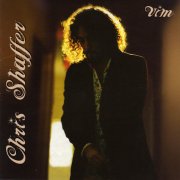 |
 |
Vim (2007/2009, 49.02) ***/TTT½ |
|
| Again Beautiful World What the Hell Sooner Than Later Wake Up She's a Diamond Run Around Wasted Departure |
I Want More Stone Cold Sober Share the Stage |
||
Current availability:
Chamberlin used:
The Why Store formed in the late '80s, split in 2000, reformed briefly in 2005, then again in 2007. Mainman Chris Shaffer recorded two solo albums, the second of which, 2007's Vim, was reissued under the band name two years later. It doesn't easily lend itself to description, despite consisting of quite mainstream elements; maybe 'punk/indie/singer-songwriter'? Categorisation isn't helped by Shaffer's insistence on refusing to stick to one style for more than a track or two. Note: this is not a bad thing. Top tracks? Powerpop-ish opener Again, Sooner Than Later and the ten-minute Run Around Wasted, a track that attempts to squeeze every popular music genre of the last fifty years into one song.
Producer Rusty Anderson plays Chamberlin, sounding pretty real, I have to say, with strings on opener Again, Sooner Than Later and Run Around Wasted, flutes on What The Hell (albeit very briefly), Departure and Stone Cold Sober and both on She's a Diamond, making for a surprisingly tape-replay-heavy release. Can I recommend this? Hmmm. Nothing if not adventurous, whether or not it actually hangs together can only be a matter for the individual.
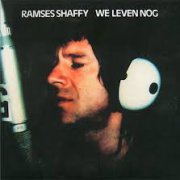 |
We Leven Nog (1975, 44.17) ***/T |
|
| Wij Zullen Doorgaan Terras Goden Vader Josje Door Alles Heen We Leven Nog Zon |
De Nieuwe Brug Doudy Echo Op de Dam |
|
Current availability:
Mellotron used:
Ramses Shaffy (1933-2009, seemingly his real name, possibly due to his being half Egyptian) was a French-born Dutch singer/actor, whose seventh album, 1975's Dutch-language We Leven Nog, is a fairly typical singer-songwriter pop/rock release of its era, at its best on the sparse Goden, Josje and the title track. I'm less sure about the jaunty Doudy and the overblown orchestral balladry of closer Op De Dam, but there you go.
It's difficult to tell where Chris Pilgram's Mellotron actually appears, due to the orchestra used on several tracks, but the flutes and cellos on the title track are a definite. In all honesty, you're not going to rush out to hear this one, but (as you can see from my rating) I've heard a great deal worse.
 |
Alya (2000, 87.30) ***/TT |
|
| Sunset Lost Angels Time Trap Starless Nights Seals Alya The First Inquisition Pain? |
Pain! Sentence The Dark Kingdom The Last Drink Alya Babylon New Angels Open Skies |
|
Current availability:
Mellotron used:
Shakary seem to be more of a project than a band, led by multi-instrumentalist Scandy. Although they're based in Switzerland, there's a noticeable connection with current Italian proggers Clepsydra, with one of the other two 'full' members involved, while their vocalist guests throughout. Their debut, Alya, is a slightly over-ambitious double CD featuring some sort of Biblical concept, although it manages not to be too intrusive. The music? Somewhere between several progressive styles, to be honest; I hear classic symphonic, '80s neo-prog and the more modern hybrid style of Spock's Beard et al., with the latter tending to dominate.
I'm not personally that blown away by the album; it's overlong, while short on ideas, particularly in the melody department, although there are some nice moments here and there. It's pretty derivative, too; other online reviews have pinpointed bits of IQ (specifically their Subterranea opus, oddly) and a very 'Waiting Room'-like piece in Pain! I really don't like Aluisio Maggini's voice, either; it tends to grate and he over-emotes at every opportunity. Good points? Carlo Cantini's violin interjections stand out (it's the first sound you hear on the album) and the occasional use of Stefano Pista Salvadè's trumpet is unusual enough to be noteworthy, but the persistent digital synths scattered all over the place drag the whole thing down - in my humble opinion, of course. Anyway, the (real, studio) Mellotron is played by secondary keys man Giovanni Galfetti. It certainly isn't overused, with not-especially-overt string parts on Sunset and Seals on disc one and some polyphonic flutes on disc two's The Dark Kingdom, with some more upfront strings on Babylon and Open Skies.
So... Some of you will love this; some of you won't. I'm willing to accept that it may grow on me with subsequent listens, but I suspect not by that much. It most certainly has its moments, but there's far too much unnecessary faff and editing it down to a single disc should've been pretty easy; after all, if the fantastically verbose Dream Theater managed to trim their surprisingly excellent Scenes From a Memory to below 80 minutes, why can't this bunch? Anyway, a so-so release, with a modicum of Mellotron, but I've certainly heard better in the last few years. Incidentally, their second album, 2002's The Last Summer 'features' some rather poor Mellotron samples.
See: Samples etc.